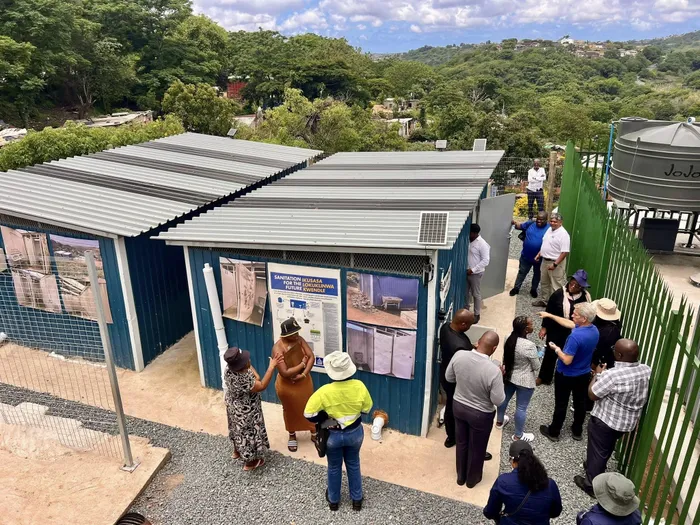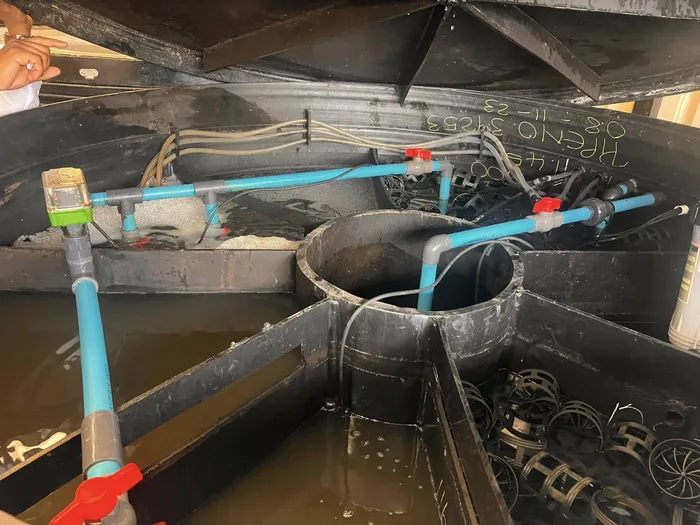Innovative sanitation solutions showcased at a Durban informal settlement

An innovative sanitation project in the Ekuthuleni informal settlement in the Durban area. Government officials inspected the Aquonic wastewater treatment, a compact modular treatment system during a Sanitation Month awareness campaign on Wednesday.
Image: Saul Basckin / Supplied
An innovative sanitation project in the Ekuthuleni (Shallcross) area took centre stage during a Sanitation Month awareness campaign in Durban on Wednesday.
Deputy Minister of Water and Sanitation (DWS), Sello Seitlholo, led the campaign jointly with the Water Research Commission, the University of KwaZulu-Natal, and the eThekwini municipality.
Officials inspected the Aquonic wastewater treatment, a compact modular treatment system that turns black and grey water into reusable water for toilet flushing and irrigation. The campaign showcases innovative sanitation projects that aim to address challenges and develop solutions for sanitation services in eThekwini.
The Ekuthuleni informal settlement on Chiltern Road is one of several sites across the country testing the Water Efficient Sanitation Solutions (WESS). The settlement has 50 houses, which have existing community ablution blocks.
This year’s theme for World Toilet Day is “Sanitation in a changing world”.
On Thursday, Seitlholo inspected the KwaMashu Wastewater Treatment Plant to assess the advanced sludge treatment technology, called Latrine Dehydration and pasteurisation.
According to the municipality, the toilets are being installed in households that previously relied on pit latrines and urine diversion toilets.
“Part of the technologies being rolled out are the eco twin leach pit, easy flush toilets, and potable wastewater treatment plant. These toilets are off-grid and use two litres of grey water for flushing. Grey water is water that has been used for washing or bathing and can be reused. Rainwater can also be used for flushing these toilets,” it said.
Councillor Mdu Nkosi, chairperson of the eThekwini Municipality Trading Services Committee, recently mentioned that he led a delegation from an African country to inspect the sanitation projects two months ago.
He stated their intention to expand this project to include schools and all informal settlements.
Nkosi said the municipality has received positive feedback from communities using the eco-friendly toilets, including Dassenhoek, Itshelimnyama, Verulam, Zwelisha, Bulfesdraai, Umlazi, and Imfume.
“We are proud that other countries want to benchmark our sanitation projects. The new projects do not connect with the municipal network, which will result in less maintenance. I have also received feedback from women in particular that this system is hygienic, putting them out of harm's way. The communities have also taken care of the infrastructure and prevented vandalism,” Nkosi said.
Saul Basckin, ActionSA councillor and eThekwini Trading Services Committee member, said the work being done is promising; however, innovation must be matched with accountability and real implementation.
He said oversight is important, but what matters is that these projects are completed, maintained, and deliver measurable results for residents.
“We must ensure that these initiatives do not become another set of stalled projects. We will continue pushing for clean governance, technical competence, and action-driven leadership in water and sanitation across eThekwini,” he said.
zainul.dawood@inl.co.za

The Aquonic wastewater treatment, a compact modular treatment system that turns black and grey water into reusable water for toilet flushing and irrigation.
Image: Saul Basckin / Supplied
Related Topics: